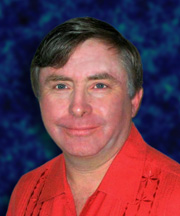

 Skip to navigation
Skip to navigation
Site Primary Navigation:
- About SDSC
- Services
- Support
- Research & Development
- Education & Training
- News & Events
Search The Site:

Published 06/10/2008
For Immediate Release
Media Contacts:
Jan Zverina, SDSC Communications
(858) 534-5111 or
jzverina@sdsc.edu
Warren R. Froelich, SDSC Communications
(858) 822-3622 or
froelich@sdsc.edu

|
"We are delighted to welcome Mike officially," said Fran Berman, Director of SDSC, an organized research unit of UC San Diego. "Mike has been working informally with SDSC this year and has demonstrated tremendous value and leadership, both on campus and at SDSC. With Mike's stellar credentials as a distinguished professor at UCSD and as an internationally recognized computational scientist, his leadership at SDSC is already proving to be a tremendous asset to the organization."
Norman joins SDSC as the supercomputer center nears completion of an 80,000-square foot, award-winning 'green' building expansion. The addition is scheduled to open in fall 2008, doubling the overall size of the supercomputer center. Nearly 5,000 square feet of machine room space will be added, bringing SDSC's total machine room area to approximately 18,000 square feet.
"This is an exciting time for SDSC, and I am honored to have the opportunity to help guide the center in this next chapter of collaboration as we all work to promote full integration between campus-wide efforts and SDSC on cyberinfrastructure-oriented research, development and education." said Norman. "I also look forward to forging new partnerships across the entire UC system, as well as with organizations in San Diego, throughout California, and throughout the world, as we provide the highest levels of expertise in data-intensive computing for the entire spectrum of investigative science."
Norman, named a Senior Fellow of SDSC in 2000, is an internationally recognized astrophysicist, using advanced computational methods to explore the universe and its beginnings. He directs the Laboratory for Computational Astrophysics, a collaboration between UCSD and SDSC resulting in the Computational Astrophysics Data Center (CADAC), a free service for the astrophysics community that hosts a public data collection from large astrophysical simulations and provides data-analysis resources to researchers worldwide.
Norman is also one of the world's leading users of supercomputing time, both at SDSC and throughout the TeraGrid, the world's largest open scientific discovery infrastructure that links 11 supercomputer sites around the U.S. He is currently completing a record-setting simulation that will be the largest cosmological calculation to date, as his research examines the dynamics of the Reionization Era - when there was enough radiated energy to ionize, or remove electrons from natural gases, making the universe translucent after its formation.
Norman's work has earned him numerous honors, including receiving Germany's prestigious Alexander von Humboldt Research Prize, the IEEE Sidney Fernbach Award, and several HPCC Challenge Awards. He also is a Fellow of the American Academy of Arts and Sciences, and the American Physical Society.
Norman holds an M.S. and Ph.D. in Engineering and Applied Science from UC Davis, and completed his post doctoral work at the Max Planck Institute for Astrophysics , in Garching, Germany, in 1984. From 1986 to 2000, Norman held numerous positions at the University of Illinois in Urbana, as an NCSA associate director and senior research scientist under Larry Smarr, currently UCSD's director of the California Institute for Telecommunications and Information Technology (Calit2), and as a professor of astronomy. Prior to that, he was a staff member at Los Alamos National Laboratory from 1984 to 1986.
About SDSC
Founded in 1985 on the campus of UC San Diego, the San Diego Supercomputer Center is an international leader in creating and providing cyberinfrastructure for data-intensive research and education. Cyberinfrastructure refers to the ability to harness the technologies of the Information Age to accelerate innovation, access, and discovery.
SDSC's cyberinfrastructure resources include world-class interdisciplinary experts, high-end computing resources, and more than 25 petabytes of archival storage - making it the largest data storage center of any academic institution. SDSC collaborates each year on more than 100 University of California, national, and international projects, fulfilling its mission to transform research and education through cyberinfrastructure. A founding member of TeraGrid, SDSC will complete a major "green" building expansion this fall that will double the size of the supercomputer center and serve as a major new technology resource for UC San Diego and beyond.
San Diego Supercomputer Center (SDSC):
www.sdsc.edu
Laboratory for Computational Astrophysics:
http://lca.ucsd.edu/portal/
National Science Foundation:
www.nsf.gov